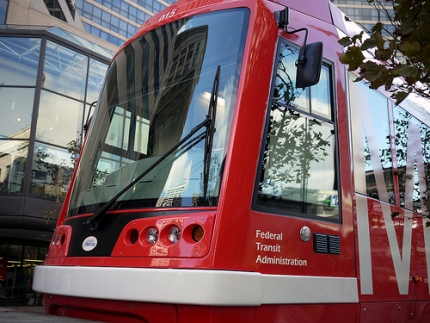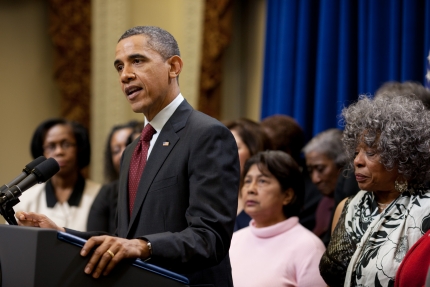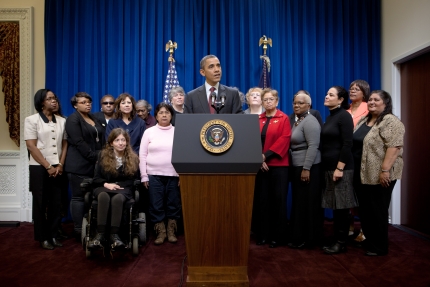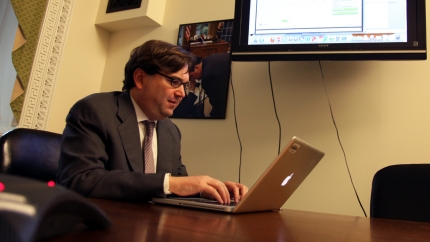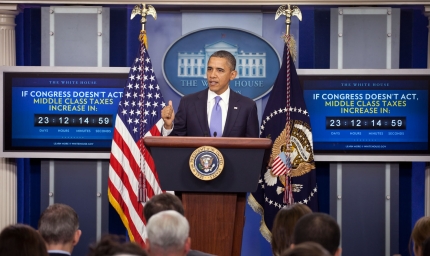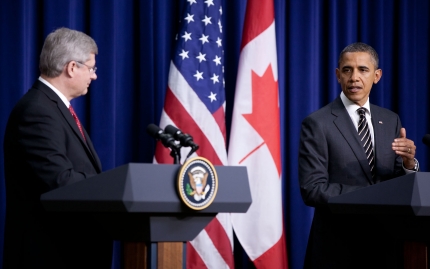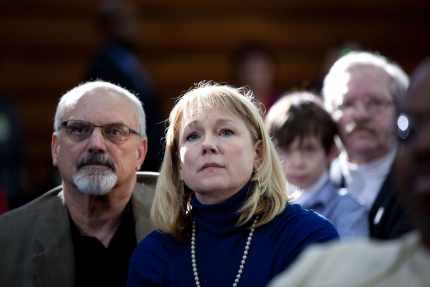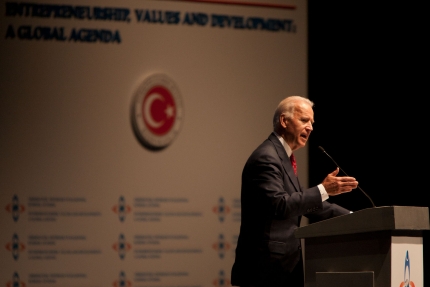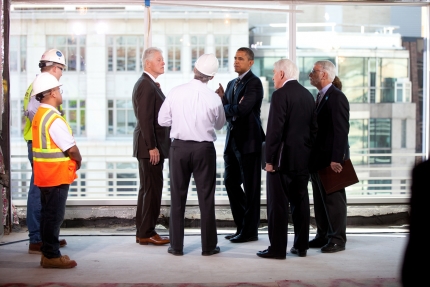Jobs News
TIGER Projects Remind Us What America Can Do
Posted by on December 16, 2011 at 4:02 PM EDTCross posted from the Department of Transportation's blog.
This week, the Department of Transportation continued its TIGER grant program, sending $511 million to 46 transportation projects in 33 states. Already the response has been tremendous.
At City Halls in Philadelphia and Cincinnati, and on the phone with major and local media outlets across the country, folks seem excited about the benefits these projects will provide and the jobs they'll create. I expect even more enthusiasm in Chicago shortly.
In the historic Philadelphia City Hall's Reception Room, I was happy to share with Mayor Michael Nutter and others the news of a $10 million grant for the city's IMPaCT project. This award will help pay for upgrades to 100 traffic lights and connect these controllers to the city’s traffic management system through fiber optic cable. The project includes technology to extend green lights for buses and trolleys when they need more time to get through an intersection. The money will also support upgrades to handicapped ramps and pedestrian countdown signals at crosswalks.
When completed, this $32 million program will improve traffic flow for transit vehicles, synchronize signals to keep motorists moving, and increase safety for pedestrians and people with disabilities. That sounds like a big win for all Philadelphians.
Learn more about EconomyInvesting in a World-Class Education System
Posted by on December 15, 2011 at 8:19 PM EDTTo explore two interactive maps that show how investments in our schools will affect each state and district across the country, click here.
A report released today shows that schools across the country are in serious need of repairs and renovations that they simply can’t afford to make. From Rhode Island to Nevada, schools are operating with leaky roofs, broken pipes, and outdated mechanical and electrical systems. Far from being able to provide our students with the skills and training needed for 21st century jobs, some schools are so overdue for renovations and upgrades that they can’t be wired for internet access.
When President Obama proposed the American Jobs Act, he included a $25 billion investment in renovating and modernizing our public schools, and $5 billion to upgrade infrastructure in America’s community colleges. The repairs and construction projects needed would put hundreds of thousands of Americans back to work on a range of projects, from emergency repairs and renovations to energy efficiency upgrades to modernizing and upgrading classrooms, labs, and technology infrastructure.
As today’s report shows, the physical condition of our schools has a real impact on our students.School buildings with poor lighting, ineffective heating and cooling systems, excessive noise, or other deficiencies put students at a disadvantage—simply put, students in poor buildings are more likely to struggle academically. They are more likely to perform poorly on tests, miss days of school, or drop out altogether.
Another crucial piece of President Obama’s plan for our schools is a $30 billion investment to hire and retain teachers. Nearly 250,000 educators lost their jobs between October 2008 and October 2011 as a result of the recession’s effect on state and local budgets, and another 280,000 could be at risk without federal assistance.
America’s education system has always been one of our greatest sources of strength and global economic competitiveness. Our nation cannot expect to train our children for the high-skilled jobs of today, or for the opportunities of the future, without investments in a world-class education system.
To demonstrate the impact of the American Jobs Act’s investment in our schools, the Department of Education also released two interactive maps that show its effects on every state and school district in the country. The maps (and downloadable datasets behind them) are available here.
Learn more about EducationExtending Unemployment Insurance Is Essential for Our Economy
Posted by on December 15, 2011 at 7:09 PM EDTToday, the White House released a new report that shows how extended unemployment insurance benefits have helped, and would continue to help, the economic recovery. The report shows that unemployment insurance must be extended to ensure that millions of Americans are able to make ends meet and care for their families while looking for a job.
The report, prepared by the President’s Council of Economic Advisers, National Economic Council, Domestic Policy Council and the Department of Labor, found that five million workers will lose their benefits over the next year if Congress fails to extend unemployment insurance, including about 1.3 million people whose benefits will expire as soon as January. Additionally, the Council of Economic Advisers estimates that the economy will generate nearly 500,000 fewer jobs through 2014 if federally funded unemployment insurance benefits aren’t extended.
Extending and reforming unemployment insurance, along with extending the payroll tax cut and preventing taxes from going up on 160 million Americans, are critical components of the President’s plan to build a stronger middle class and a brighter future for the American people.
To learn more about how unemployment insurance provides important support for the millions of Americans looking for work and helps them return to work sooner, read the full report here.
Learn more about EconomyEnsuring Fair Pay for Homecare Workers
Posted by on December 15, 2011 at 4:15 PM EDTFour years ago, President Obama spent the day with Pauline Beck, a home health care worker. He followed her throughout her day -- as she got up at 5:00 in the morning to care for an 86-year-old amputee. He saw first-hand the demands of her work.
Their business is a growing industry -- one of the fastest in America. As the population of this country gets older, more Americans are turning to people like Pauline Beck to help make sure they have the care they need. And as the President said this morning, "As the homecare business has changed over the years, the law hasn’t changed to keep up." In the eyes of the law, homecare workers fall into the same category as a teenaged babysitter.
So today, the President did something to help homecare workers like Pauline Beck. He announced his support of a law to extend overtime pay protections and a guaranteed minimum wage to those who do this work:
We are going to make sure that over a million men and women in one of the fastest-growing professions in the country don’t slip through the cracks. We’re going to make sure that companies who do right by their workers aren’t undercut by companies who don’t. We’re going to do what’s fair, and we’re going to do what’s right.
Watch President Obama's full remarks here.
Learn more about Economy, Health CareProviding Protections for In-Home Care Workers
Posted by on December 15, 2011 at 12:49 PM EDTEd. note: This is cross-posted from Work in Progress, the Official Blog of the Department of Labor
In-home care service is a high growth industry, and it’s projected to grow by 50 percent between 2008 and 2018. In-home caregivers are an essential component of the health care system and will only become more important, as an increased number of patients turn to them for more affordable assistance with medical care as well as everyday tasks and household chores.
Many homecare providers earn less than the minimum wage and no overtime for these vital services. In 2007, then-Senator Obama spent a day with professional homecare worker Pauline Beck, assisting with her daily tasks and observing firsthand the unique challenges of in-home care (watch the video). He was impressed by Pauline’s dedication, and determined to assist her and others in her profession.
Today, Pauline joined me and President Obama as he announced a proposal from the U.S. Department of Labor to revise the Fair Labor Standards Act rules that would ensure fair pay for approximately 1.8 million workers who provide in-home care services for the elderly and infirm. This new rule would ensure that these hardworking professionals who provide valuable services to American families would receive the protections of minimum wage and overtime pay that nearly every employee in the United States already receives under the FLSA.
Many of these workers are the primary breadwinners for their families. Of the roughly 2 million workers who will be affected by this rule, more than 92 percent are women, nearly 50 percent are minorities, and nearly 40 percent rely on public benefits such as Medicaid and food stamps. According to the Bureau of Labor Statistics, home health care aides earn about $21,000 a year and many lack health insurance. That is unacceptable.
The proposed regulation would also ensure that employers who have been treating these workers fairly are no longer at a competitive disadvantage. Leveling the playing field for both workers and employers is a fundamental principle of the FLSA.
Learn more about Economy, Health CareWe Can't Wait: Meet the Home Healthcare Worker Who Inspired the President
Posted by on December 15, 2011 at 10:45 AM EDTToday Pauline Beck will be at the White House to watch as President Obama announces proposed changes to the Fair Labor Standards Act (FLSA) that will affect home healthcare workers like herself. Today's event has special significance for Pauline, because it was the day then-Senator Obama spent "in her shoes" that informed him of the important work these Americans do and the need to level the playing field so they are fairly compensated for their efforts. Take a minute to watch the video and learn her story.
White Board: Brian Deese on the Payroll Tax Cut
Posted by on December 14, 2011 at 10:01 AM EDTIn this new White House White Board, Brian Deese, the Deputy Director of the National Economic Council, explains how President Obama's payroll tax cut helps families, businesses, and the economy -- and why it's so important to extend that tax cut for 2012.
Watch the White House White Board video here.
Learn more about EconomyWill Extending the Payroll Tax Cut Affect Social Security? No.
Posted by on December 9, 2011 at 3:53 PM EDTLately, many Americans have asked me if the payroll tax cut will affect Social Security. The answer is simply no.
The payroll tax cut has given tax breaks to millions of families across the country this year, providing a boost to their pocketbooks. Extending it would ensure that taxes do not go up for nearly 160 million hardworking Americans on January 1st -- an increase of $1,000 for the typical household.
While more money stays in workers’ paychecks, the law specifies that Social Security receive every dollar it would have gotten even without the payroll tax cut. This happens by automatically transferring resources from the government’s general coffers to the Social Security Trust Fund. And indeed, the chief actuary of the Social Security Administration has confirmed that the payroll tax cut would have no impact on the Trust Fund.
The President believes that Social Security is a sacred compact, that in return for a lifetime of hard work, America’s seniors will have a chance to retire with dignity. We have an obligation to keep that promise and safeguard and strengthen Social Security for seniors, people with disabilities and all Americans, both now and in the future.
The President also believes in the need to spur economic growth. The payroll tax cut will generate growth and put people back to work.
Jon Carson is Deputy Assistant to President and Director of the White House Office of Public Engagement
What You Missed: Live Chat with Jason Furman on UpNorthLive.com and 7&4 News
Posted by on December 9, 2011 at 12:02 PM EDTThis week, Jason Furman, Principal Deputy Director of the National Economic Council, answered questions from 7&4 News and UpNorthLive.com readers on jobs and the economy. Look at some of the highlights below or see the full chat over at UpNorthLive.com. And learn more about how the American Jobs Act will increase jobs and improve the economy at WhiteHouse.gov/JobsAct.
Q: Eric Kane:
As the economic powers shift from West to East, how can Americans prepare?A: Jason Furman, The White House:
Eric, that is probably the most important question facing our economy. America is still the #1 economic power in the world, with the best educated and trained workers, the best capital stock, and the best knowledge and technology. But we won't maintain this by staying on autopilot. One lesson is that we can't cut our way to prosperity and have to continue the research, education and infrastructure investments that have made us the #1 power in the world. We also have to tackle our challenges, like inequality and the budget deficit.Learn more about EconomyPresident Obama Discusses Richard Cordray and the Payroll Tax Cut
Posted by on December 8, 2011 at 2:53 PM EDTThis morning, Senate Republicans blocked the confirmation of Richard Cordray.
Shortly after, President Obama walked into the briefing room here at the White House to address that vote -- and the refusal of Congress to extend the payroll tax cut.
The President spoke first about his nominee to head the Consumer Financial Protection Bureau:
Consumers across the country understand that part of the reason we got into the financial mess that we did was because regulators were not doing their jobs. People were not paying attention to what was happening in the housing market; people weren’t paying attention to who was being taken advantage of. There were folks who were making a lot of money taking advantage of American consumers.
This individual's job is to make sure that individual consumers are protected -- everybody from seniors to young people who are looking for student loans, to members of our Armed Services who are probably more vulnerable than just about anybody when it comes to unscrupulous financial practices.
There is no reason why Mr. Cordray should not be nominated, and should not be confirmed by the Senate, and should not be doing his job right away in order to carry out his mandate and his mission.
President Obama promised to explore all options and take nothing "off the table" with respect to ensuring that the CFPB is able to fulfill its mission of protecting consumers.
President Obama meets with Prime Minister Stephen Harper
Posted by on December 8, 2011 at 12:24 PM EDTYesterday afternoon, President Obama welcomed Canadian Prime Minister Stephen Harper to the White House. Their conversation was wide-ranging, touching on the Eurozone crisis, the war in Afghanistan and the democratic transitions in the Middle East and North Africa. But the central focus of their talks was on creating jobs and boosting the economy:
[In] this mission, Canada has a special role to play. As most of you know, Canada is our single largest trading partner, our top export market, and those exports -- from cars to food -- support some 1.7 million good-paying American jobs. Canada, in turn, is one of the top foreign investors in the United States, and that creates even more jobs and prosperity.
And the Prime Minister and I are determined not just to sustain this trade but to expand it, to grow it even faster, so we’re creating even more jobs and more opportunity for our people. Canada is key to achieving my goal of doubling American exports and putting folks back to work.
The President and the Prime Minister announced two new iniatives to help achieve those aims.
First, our two nations will coordinate to introduce new technology to improve cargo security and screening at points of entry along the border. That will ease congestion and reduce the time it takes to transport products between the U.S. and Canada. That in turn will make it easier for businesses to export their goods.
Second, the U.S. and Canada will work to streamline regulations and, in some cases, eliminate them altogether. The goal here will be to align standards where possible, and this effort will focus on series of key sectors -- starting with automobiles, agriculture, and health care. The aim here is also to reduce costs for businesses.
Watch President Obama and Prime Minister Harper speak here.
Learn more about Economy, Foreign PolicyHelping Job Creators Get the Capital They Need
Posted by on December 8, 2011 at 11:45 AM EDTToday, we can do more to increase the amount of capital that flows into the hands of entrepreneurs at every stage in the growth of their companies.
Helping these businesses grow is a top priority for the Obama Administration, as we know that small businesses create most of net new jobs that are added to the economy each year. We have an economic imperative to make sure we support these firms through creating an environment where they have access to capital markets to help facilitate growth at every stage.
Over the past three years, we have made great progress in helping small businesses. The President has signed into law 17 tax cuts for small businesses, from greater expensing provisions to the President’s signature call to eliminate capital gains taxes on certain investments in small businesses as well as two new small business lending funds. SBA loans also had an all-time record year. Right now, the President continues to call on Congress to cut payroll taxes in half for nearly 6 million small businesses, providing even more incentives for them to hire and grow.
Startups and high-growth firms – the biggest job creators – have different capital needs than other small businesses. That’s why almost a year ago, we launched Startup America, a White House initiative to create the best possible climate for high-growth entrepreneurs across the country. Today, at the Startup America Partnership board meeting hosted at the White House, we are announcing two important initiatives that show how we are working to specifically address the needs of startup businesses. And the President is calling on Congress to do more.
First, today we’re announcing that the Administration has taken action to create a new Early Stage Innovation Fund through SBA’s existing Small Business Investment Company (SBIC) program. We’re making $1 billion available over the next 5 years to match private capital in funds that invest in early-stage, high growth-potential startup companies. SBA’s existing SBIC program just had a record year of helping over 1,000 businesses get $2.6 billion in capital, and created new vehicles like SBA’s first Impact Investment Fund, which recently launched in Michigan.
At the same time, the independent Startup America Partnership has mobilized commitments from more than 50 private-sector partners to deliver over $1 billion in value – from free software to free consulting and legal services – to 100,000 startups over the next three years.
And there’s more action we can take. In September, when the President announced his American Jobs Act, he called on Congress to take specific steps to help small businesses raise the funds they need to innovate and grow. Consistent with this call to action, the President is urging Congress to work on a bipartisan basis to develop these ideas by passing legislation related to:
- Crowdfunding: Nonprofits have already harnessed the power of online fundraising and social media to help meet their mission. In a similar way, we can create an appropriate regulatory framework for small businesses and startups to raise the capital they need from many small-dollar investors, while ensuring investor protections.
- Regulation A “Mini-Offerings”: For small businesses seeking to raise less than $5 million, there is an existing exemption from certain SEC requirements. But very few businesses are taking advantage of this “Regulation A” exemption today. The President has called for raising that limit to up to $50 million, making it easier for small companies to raise the capital they need to grow.
- Creating an On-Ramp for Emerging Growth Companies: For emerging growth companies, the vast majority of new jobs are typically created after they “go public.” Yet from 1995 to 2010, listings on U.S. exchanges shrank from 8,000 to 5,000 while listings on non-U.S. exchanges grew from 23,000 to 40,000. In March, after we held an Access to Capital conference, entrepreneurs and other private sector stakeholders formed an “IPO task force” and reported back to the Treasury Department with recommendations to help scale regulations for emerging growth companies while providing strong investor protections. Some of these ideas are being explored by Congress and the Administration right now.
While moving quickly to pass these initiatives, Congress must develop these proposals in ways that will continue to protect American investors. Over the past few months, we have begun to make real progress. Members on both sides of the aisle have supported legislation consistent with the ideas that the President called for. Legislation has passed the House of Representatives with overwhelming bipartisan support. And last week, these issues were highlighted at a Senate Banking Committee hearing where Chairman Tim Johnson noted “This is an issue where I believe there is real potential for bipartisan cooperation.”
Overall, efforts like these could help improve liquidity for entrepreneurs, and help jump-start the innovative American companies of tomorrow. At the same time, we need to ensure that as we develop these initiatives we are taking necessary measures to ensure that investors are protected – and the Administration will continue working with Congress to achieve this outcome.
The President, both of us, and leaders across the private sector understand that “one size doesn’t fit all” when it comes to helping small businesses, especially startups and high-growth firms. Let’s make sure they can get access to the kinds of capital they need to grow and create the jobs we need now.
Learn more about EconomyCalling All Innovators – Health Care Innovation Challenge Open for Great Ideas
Posted by on December 7, 2011 at 11:27 AM EDTRecently, the Department of Health and Human Services, through the Affordable Care Act, launched the Health Care Innovation Challenge, which will award $1 billion in grants to applicants who will implement the most compelling new ideas to deliver better health and improved care at lower costs to people enrolled in Medicare, Medicaid and the Children’s Health Insurance Program (CHIP)—particularly those with the greatest health care needs.
The Challenge is a signature initiative of the Center for Medicare and Medicaid Innovation, and promises to catalyze new approaches that support health care delivery transformation. It offers an unprecedented opportunity for innovators and entrepreneurs who have been working tirelessly on new care improvement models but have often faced great difficulty bringing them to the patients who need them in today’s reimbursement environment. This Challenge will help us by:
- Identifying new ways of paying for health care that improve care at reduced cost and can be scaled nationally by CMS and the Department of Health and Human Services.
- Engaging a wide variety of innovators to help come up with new and promising ideas. Interested parties of all types are welcome to apply. Doctors, nurses and other care providers, hospitals, health systems, payers, technology entrepreneurs and other private sector organizations, faith-based organizations, local governments, and public-private partnerships are some of the professionals and organizations we expect to apply. In addition, certain organizations may apply as conveners to assemble and coordinate groups of participants.
- Helping to create jobs. The Challenge gives priority to applicants that identify opportunities for job creation. By rewarding public sharing and rapid deployment of such ideas, the Challenge will boost our ability to deliver on the promise of health care delivery innovation. We also believe that by attracting top talent to the health care sector and identifying pathways for innovators to build rewarding careers in this industry, we will both solidify our position as the world’s most competitive healthcare workforce and also help strengthen the foundation for better health for our citizens well into the future.
- Encouraging “enhanced infrastructure” to support more effective system-wide function. In this context, we hope this Innovation Challenge will serve as a call to action for technology and data innovators to team with care innovators to propose solutions that can be implemented with speed and have the capacity to scale.
- Promising smart answers fast. We need your “letters of intent” by December 19th, 2011, with full applications by January 27th, 2012. Winners will be awarded by March 2012 with three-year grants ranging from $1 million to $30 million.
Some of the greatest transformations American healthcare has seen have come from sources outside its traditional boundaries — for example, health care has borrowed widely from the automotive, aerospace, and defense industries to innovate. So please share this post far and wide to innovative thinkers in every corner of American industry – even to those who haven’t yet actively engaged in the health care delivery sector. There’s never been a better time to innovate in health care – as more and more of the information required to power innovations that safeguard and improve health becomes available and accessible, and as the health care system begins to reward providers for keeping patients healthy and delivering value, not just volume. Answer the Health Care Innovation Challenge, and play your part in improving the nation’s health care system by proposing new ideas that deliver better health and improved care at lower costs to people with Medicare, Medicaid and CHIP.
What a Fair Shot at Success Means
Posted by on December 6, 2011 at 7:47 PM EDTWatch President Obama's full remarks here.
In the state where his mother was born, President Obama made an argument about laying a new foundation for broad-based prosperity in America.
"It starts," he said, "with making sure that everyone has a fair shot at success."
That means giving Americans the education, infrastructure, and resources necessary to out-innovate our global competitors, structuring our tax system fairly to pay for those investments, and it means creating an environment where everyone -- from Main Street to Wall Street -- plays by the same set of rules. The President said:
As infuriating as it was for all of us, we rescued our major banks from collapse, not only because a full blown financial meltdown would have sent us into a second Depression, but because we need a strong, healthy financial sector in this country.
But part of the deal was that we would not go back to business as usual. That’s why last year we put in place new rules of the road that refocus the financial sector on this core purpose: getting capital to the entrepreneurs with the best ideas, and financing to millions of families who want to buy a home or send their kids to college. We’re not all the way there yet, and the banks are fighting us every inch of the way.
And Republicans are standing with Wall Street to block broader reform by refusing to confirm a head of the Consumer Financial Protection Bureau -- the watchdog group is charged with protecting everyday Americans from lenders who are out to take advantage of them. Here's what President Obama had to say:
The man we nominated for the post, Richard Cordray, is a former Attorney General of Ohio who has the support of most Republican and Democratic Attorneys General throughout the country.
But the Republicans in the Senate refuse to let him do his job. Why? Does anyone think the problem before that led to this crisis was too much oversight of mortgage lenders or debt collectors? Every day we go without a consumer watchdog in place is another day when a student, or a service member, or a senior citizen could be tricked into a loan they can’t afford – something that happens all the time. Financial institutions have plenty of lobbyists looking out for their interests. Consumers deserve to have someone whose job it is to look out for theirs. And I intend to make sure they do.
The Senate is slated to vote on Richard Cordray's confirmation later this week. Check back at WhiteHouse.gov for more information.
Learn more about Economy,President Obama: "In America, We Are Greater Together"
Posted by on December 6, 2011 at 6:43 PM EDTMore than a century after Teddy Roosevelt outlined a vision for a "New Nationalism" in a Kansas town called Osawatomie, President Obama visited the same community to talk about what he called a make-or-break moment of the middle class.
He described how the world has undergone an economic transformation unlike any other in our collective history -- and how that change has upended our expectations of social mobility in this country. Where professionals ranging from factory workers to travel agents to accountants once enjoyed the promise of a good job and steady income in exchange for their hard work, today they and a range of people like them must compete with new technology and individuals from around the world.
The President told the 1,200 people gathered in Osawatomie that there are two ways to respond to these challenges.
Some in Washington, he said, argue that we should let the markets take care of everything -- rolling back regulation and slashing taxes:
Now, it’s a simple theory. And we have to admit, it’s one that speaks to our rugged individualism and our healthy skepticism of too much government. That’s in America’s DNA. And that theory fits well on a bumper sticker. But here’s the problem: It doesn’t work. It has never worked. It didn’t work when it was tried in the decade before the Great Depression. It’s not what led to the incredible postwar booms of the ‘50s and ‘60s. And it didn’t work when we tried it during the last decade.
Thankfully, President Obama said, we can choose a different path:
[T]here’s another view about how we build a strong middle class in this country -- a view that’s truer to our history, a vision that’s been embraced in the past by people of both parties for more than 200 years.
It’s not a view that we should somehow turn back technology or put up walls around America. It’s not a view that says we should punish profit or success or pretend that government knows how to fix all of society’s problems. It is a view that says in America we are greater together -- when everyone engages in fair play and everybody gets a fair shot and everybody does their fair share.Read the entire speech here.
School Lunch Pioneer Says the American Jobs Act Will Help Him Make Great Hires
Posted by on December 5, 2011 at 10:00 AM EDTThe Bridge to Work provision of the American Jobs Act will enable Justin Gangon's California company, Choicelunch, to offer training in the extremely marketable food service industry to disadvantaged youths in 2012. Provisions in the President's comprehensive plan to immediately put workers back on the job and put more money in the pockets of working Americans will also help the company optimize long-term employee retention by allowing both Choicelunch and prospective employees to determine a better fit prior to hiring. Gangon, a co-founder, says the American Jobs Act will help him grow his business in 2012:
"In doing my initial research, I believe the Bridge to Work provision could be a great benefit. We have a lot of employees who have been with us for years, and we've had people walk-off the job in the first few hours after making it through a lengthy interview process because they didn't fully realize what it would entail (even though we allow them to observe the work performed and detail the job at length). Ultimately, putting people in a job on a provisional basis is as good for the employee as it is for the employer - both sides get to assess if it's a good match and the probability of long-term success, retention and job satisfaction increases."
Learn more about , EconomyVice President Biden Attends Summit to Champion Entrepreneurial Spirit Around the World
Posted by on December 3, 2011 at 4:45 PM EDTEarlier today in Istanbul, Vice President Biden addressed the second Global Entrepreneurship Summit, convened by Prime Minister Recep Tayyip Erdogan. The Vice President is leading the U.S. delegation to the summit, which follows the 2010 Presidential Summit on Entrepreneurship hosted by President Obama in Washington, D.C.
This year’s summit comes at a critical moment in the Middle East and North Africa as millions have risked their lives for political freedom and economic opportunity.
"Democratic revolutions like the ones in Tunisia, Egypt and Libya -- and the ones still unfolding in Syria and Yemen --are imbued, literally imbued with entrepreneurial spirit, a spirit that requires risk and initiative, steadfast determination, and a unifying idea," said Vice President Biden. "They aim to do more than merely change the government which is in power, but also to end practices like authoritarianism, corruption, the stifling of free expression -- practices that make political and economic freedom impossible."
The Vice President also highlighted how entrepreneurs are a driving force for job creation and economic growth in the United States.
"Once, the wealth of a nation was primarily measured by the abundance of its natural resources, the expanse of its landmass, the size of its population and the power of its armies," the Vice President said. "Today, the true wealth of a nation is found in the creative minds of its people and their freedom and ability to bring those ideas to life -- to develop not only new products, but the technologies that will create entirely new industries, entire new markets, entire new opportunities."
Learn more about Economy, Foreign PolicyPresident Obama Announces $4 Billion Investment to Make Buildings More Energy Efficient
Posted by on December 2, 2011 at 3:36 PM EDTThis morning, President Obama met with former President Bill Clinton to announce the next piece of the "We Can't Wait" campaign -- a $4 billion effort to improve energy efficiency in buildings across the country.
The two were joined by Tom Donohue -- the head of the U.S. Chamber of Commerce -- and Randi Weingarten -- the president of the American Federation of Teachers.
The group toured a building in northwest Washington that's currently seeing an efficiency upgrade. That improvement employs around 250 full-time workers and will save the building $200,000 a year on its energy bills.
Making our buildings more energy efficient is one of the fastest, easiest, and cheapest ways for us to create jobs, save money, and cut down on harmful pollution, President Obama said:
It is a trifecta, which is why you’ve got labor and business behind it. It could save our businesses up to $40 billion a year on their energy bills – money better spent growing and hiring new workers. It would boost manufacturing of energy-efficient materials. And when millions of construction workers have found themselves out of work since the housing bubble burst, it will put them back to work doing the work that America needs done. So this is an idea whose time has come.
As part of today’s announcement, President Obama directed all Federal agencies to make at least $2 billion worth of energy efficiency upgrades over the next two months. Additionally, 60 private companies, hospitals, cities, states, colleges, and universities, among others, have collectively committed another $2 billion in energy efficiency retrofits to 1.6 billion square feet of property—roughly the equivalent of 500 Empire State Buildings.
The investments announced today are part of President Obama’s Better Buildings Initiative, which set a goal of improving energy efficiency in commercial buildings by 20 percent by 2020. The initiative will reduce energy bills for businesses by $40 billion per year, and one report found it could create up to 114,000 jobs.
More information:
Learn more about Economy, Energy and EnvironmentThe Employment Situation in November
Posted by on December 2, 2011 at 10:35 AM EDTToday’s employment report provides further evidence that the economy is continuing to heal from the worst economic downturn since the Great Depression, but the pace of improvement is still not fast enough given the large job losses from the recession that began in December 2007.
Private sector payrolls increased by 140,000 in November and overall payroll employment rose by 120,000. The unemployment rate fell 0.4 percentage point to 8.6 percent, the lowest unemployment rate since March 2009. About half of the drop in unemployment in the household survey was due to a decline in the labor force (-315,000) and about half to employment growth (+278,000). Despite adverse shocks that have created headwinds for economic growth, the economy has added private sector jobs for 21 straight months, for a total of 2.9 million jobs over that period. Nonetheless, we need faster growth to put more Americans back to work.
While the U.S. economy is healing, the world economy continues to be in a fragile state and all economies are linked through trade and finance. In this environment, the President’s American Jobs Act is the right medicine to sustain and strengthen the recovery. In particular, with 13.3 million Americans still unemployed, and 43 percent of them unemployed for 6 months or longer, it would be a setback for the economy and American families if Congress were to allow extended unemployment benefits to expire at the end of the year. The President’s proposal to extend and expand the payroll tax cut for workers and small businesses also would provide a substantial boost to economic growth and job creation.
Sectors with employment increases in November included retail trade (+50,000), professional and business services (+33,000), leisure and hospitality (+22,000), health care and social assistance (+19,000), and manufacturing (+2,000). The temporary help services industry, which is often a leading indicator of future job growth, increased for the fifth month in a row, by 22,300. Sectors with employment declines included government (-20,000) and construction (-12,000). State and local governments lost 16,000 jobs and have shed 430,000 jobs since February 2010.
The monthly employment and unemployment numbers are volatile and employment estimates are subject to substantial revision. Therefore, as the Administration always stresses, it is important not to read too much into any one monthly report.
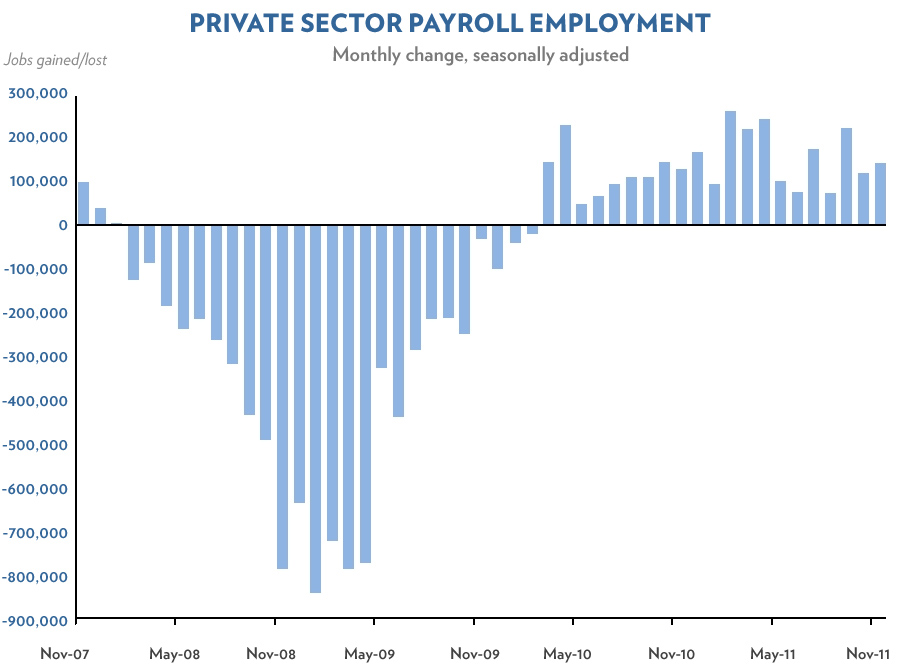 Learn more about Economy
Learn more about EconomyNevada Entrepreneurs Say Passing the American Jobs Act Would Encourage Them to Create New Jobs
Posted by on December 2, 2011 at 9:00 AM EDTThe White House Business Council invited small business owners and entrepreneurs from across the country to a forum we hosted with Business Forward earlier this month. While they were here, we spoke to some of the people we met about the secrets of their success, and found out how the American Jobs Act will enable them to grow even more quickly in 2012.
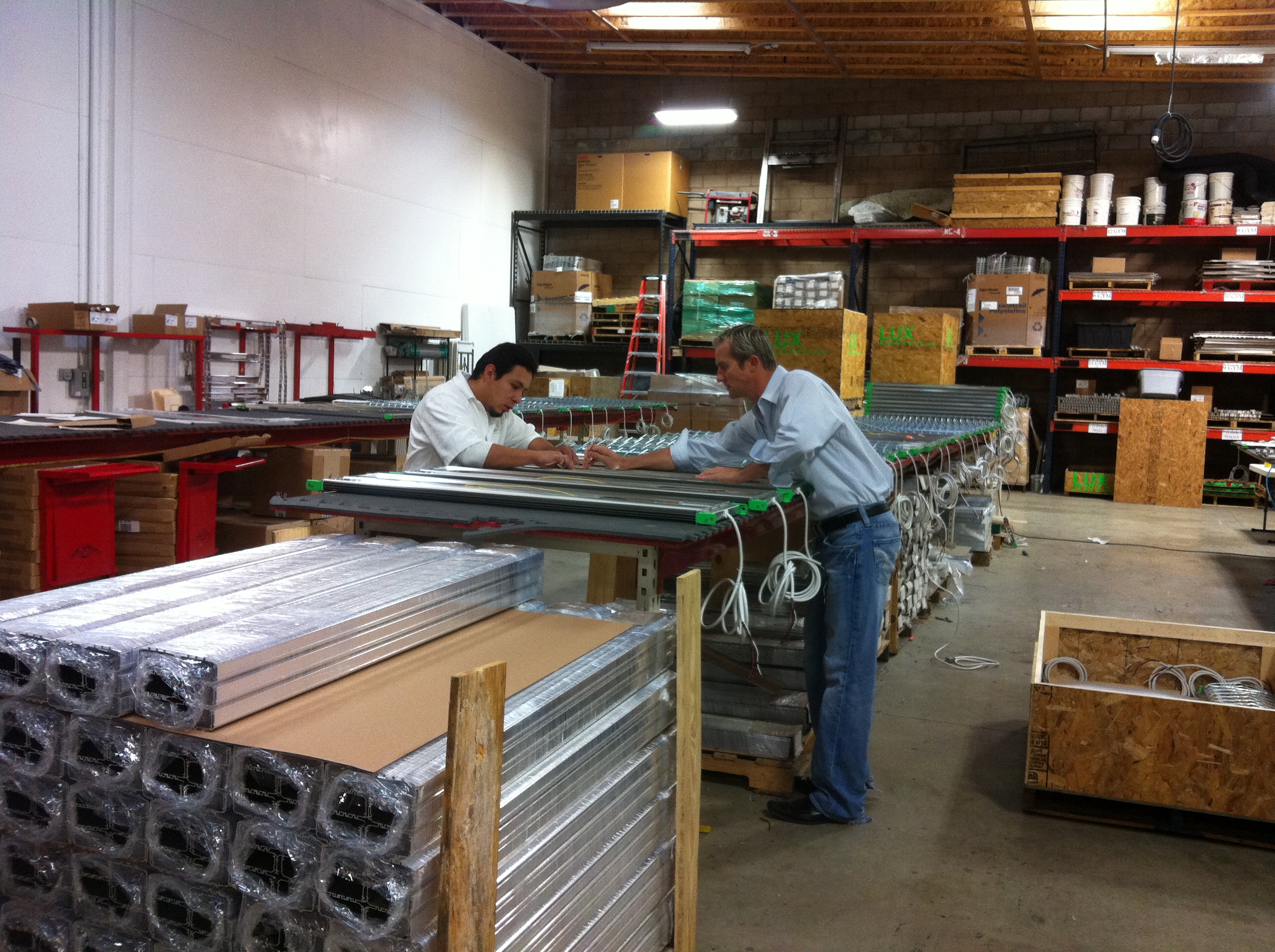
In 2008, John McCarty and Patrick O’Flaherty teamed up to reinvent the light fixture. O'Flaherty, a 20-year veteran of the lighting industry, designed LUX dynamics’ fixtures to save energy while McCarty, who is an architectural engineer, applied his past experience bringing innovative products to market to find an audience for the fixtures, which are made of lightweight extruded aluminum rather than pressed steel for a long-lasting design. They are also intentionally easy to install, a key differentiator in the marketplace, and save users and contractors money while also conserving energy.
Today the fixtures are used in commercial/industrial applications such as school gyms, sports arenas, and correctional facilities but in the beginning, it wasn’t clear that McCarty and Flaherty would be able to produce their innovative designs, which could not be built using conventional equipment. McCarty says, “We had to make a choice to either change our design to something that was similar to what manufacturers’ already made or start from scratch making light fixtures in an entirely new way. We chose the latter, which enabled us to make better products, revolutionizing the industry.”
LUX products are all made in the USA and the company partners with Alpha Production Technologies, a Sparks, Nevada organization that employs people with disabilities, to manufacture subassemblies. At least half of the components are purchased from businesses in Reno and Sparks. The American Jobs Act would enable LUX dynamics to grow their business and create more jobs in Nevada. “The investments in renovating/modernizing schools with energy efficient measures would increase our potential business opportunities since our primary market is manufacturing energy efficient lighting for schools,” says McCarty. “And the hiring tax credit would encourage me to create the jobs needed for us to grow.”
Learn more about Economy
- &lsaquo previous
- …
- 5
- 6
- 7
- 8
- 9
- 10
- 11
- 12
- 13
- …
- next &rsaquo
